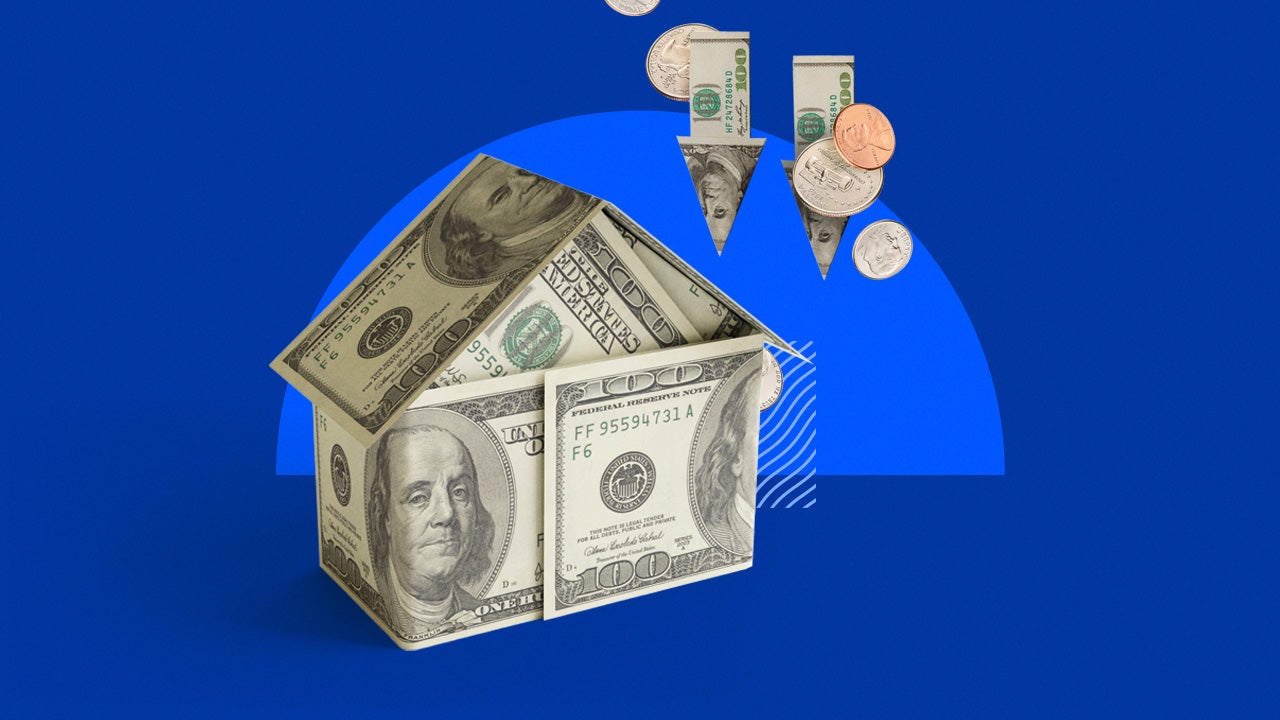Do I lose home equity after refinancing?




Key Takeaways
- Refinancing’s impact your home equity depends on the sort of refinance you do.
- With a rate-and-term refinance, your equity stake shouldn’t change, as you’re only replacing your current mortgage with a new one. But a cash-out refinance involves borrowing against your ownership stake, which does reduce your equity.
- You can also lose equity if you roll closing costs into the new loan, or your home appraises for less.
Refinancing your mortgage doesn’t have to mean losing home equity. Just the opposite, in fact: The goal of a refi generally is to get a new loan with lower interest rates, making repayments easier and allowing you to build equity faster.
However, refinancing can cause you to lose money in the long run if you are not careful, and the process itself can affect your home’s equity overall. Before deciding to refinance, here’s what to consider to ensure you don’t diminish your hard-earned home equity stake.
How does refinancing affect the equity you have in your home?
Usually, it doesn’t. If your home is appraised at $300,000 and you owe $150,000 on your mortgage, refinancing that mortgage does not change the fact that your home is worth $300,000.
Factors that determine the equity in your home include the balance owed on your mortgage and how much your home is worth. The difference between these two figures is your home equity.
During the course of refinancing, your mortgage balance can increase in various ways, which decreases your equity. For example, when refinancing your mortgage, you’ll incur closing costs (just as you did with your original home loan). If you opt to have these upfront expenses rolled into the new mortgage, instead of paying them right away, you’re augmenting the mortgage balance — the amount you owe — and thus diluting your equity — the amount you own.
Similarly, a cash-out refinance can impact your home equity. This type of refi means you are pulling from your equity to receive ready money. To provide you with that cash, the lender increases your loan balance to cover the lump sum payment. And once again, your home equity is diminished.
On the flip side, you can build your equity over time by refinancing to a shorter loan term loan, from a 30-mortgage to a 15-year mortgage. “With a shorter repayment period, you’ll pay off the principal balance more quickly, increasing your ownership stake in the home,” says Linda Bell, senior writer on Bankrate’s Home Lending team.
When you can lose home equity by refinancing
During a refinance, there are several instances when you could lose equity. This can happen when:
- You take out a larger mortgage using a cash-out refinance
- You roll the refinance closing costs into your new loan
- Your home appraisal comes in low, which decreases the worth of your equity stake
Straight refinance vs. cash-out refinance
There are two ways that you can refinance your mortgage: a straight refinance or a cash-out refinance.
- Straight refi: A straight refinance (aka a rate-and-term refinance) is when you borrow exactly the same amount you owe on your current mortgage. Refinancing can enable you to obtain lower interest rates compared to your old loan. The more quickly you are able to pay off your loan, the more quickly you build up your home’s equity. Therefore, a straight refinance could help you increase your home’s equity in the long run.
- Cash-out refi: By contrast, cash-out refinance could dramatically diminish your home equity. The extra amount you borrow comes from your ownership stake, using it as collateral for the lump sum. In other words, you are turning some of your equity back into debt.
While you can use the cash from the refi for a variety of purposes, it’s generally best for home improvement projects, repairs or anything else that will put value back into your home, and replenish the worth of your ownership stake. Otherwise, you have substantially diluted it, and only years of mortgage repayments — and/or a big rise in real estate values — will build it up again.
What happens to your home’s equity when you refinance?
Refinancing can impact your home’s equity for better or for worse. It is important to consider lender fees and closing costs, in addition to having a clear understanding of the current value of your home. Here are some of the main ways that refinancing can impact your home’s equity.
Lender appraisal
Lenders conduct an appraisal when you submit a loan application, which is why you should have a sense of the current market value of your home. Your home could have increased or decreased in value since your last appraisal. The amount that the home now appraises for impacts the size of your new mortgage, the value of your equity stake, and — if you’re doing a cash-out refi — how much cash you can actually receive.
Appraisers will consider basic features about your property — age, square footage, number of rooms — along with neighborhood factors such as crime rates, school zones and proximity to local fire stations. The appraisal will also compare your home with similarly sized properties that have recently sold. If you over- or underestimate your home’s value when deciding how much you want to refinance, you could risk losing money or missing out on lower interest rates.
Fluctuating property values
Calculations of your home equity stake begin with the overall value of your property. The real estate market can be variable and your home’s worth can increase and decrease based on its fluctuations. If your home’s value varies, the value of your home equity stake will too.
Closing costs
Several social and economic factors impact property values and by extension, your home’s equity, including unemployment levels, interest rates, crime rates and rezoning in your area. Historically, real estate has appreciated over the long term, but it can move slowly and inconsistently. Values can also vary quite a lot between regions.
Whatever the state of the housing market, it’s important to get a strong sense of how much equity you have in your home before refinancing or taking out any loans against your home’s value. Otherwise, you could end up paying too much to refinance your mortgage, or missing out on savings opportunities if you underestimate — or falling short of your needs if you overestimate.
How much home equity do I need to refinance?
To refinance a conventional mortgage, you typically need at least 20 percent equity in your home. This means your current mortgage balance should be no more than 80 percent of your home’s appraised value, technically known as an 80 percent loan-to-value (LTV) ratio.
However, government-backed loans like FHA, VA, and USDA may have different requirements. FHA streamline refinances and VA loans might not require an appraisal, allowing refinancing with little or negative equity.
“If you aren’t sure how much equity you have or which refinancing option is best for you, reach out to a mortgage professional,” says Bell. “They can give you personalized advice and help you make the best choice for your home and wallet.”
Home equity loan vs. refinancing: What’s the difference?
Refinancing isn’t the only option you have when you want to access your home equity. So what are the differences between a home equity loan and a cash-out refinance?
Both mean you are putting up your home as collateral for debt. But a cash-out refinance involves a new mortgage. It’s a way to take advantage of a drop in interest rates — if they are trending lower than when you took out your first loan — and possibly change your loan term as well. It can be a good option if you just want to have one monthly payment or to save money on interest over time.
A home equity loan, often dubbed “a second mortgage,” is a whole different animal. Getting a home equity loan means you keep your original mortgage, and are taking on a new debt — the size of which is based on your home equity. This means you have to manage two monthly payments. Still, it can be a good option if you want to keep the current interest rate you have on your mortgage.
Can I still take out a home equity loan after I have refinanced my home?
It is still possible to take a home equity loan after refinancing, but in order to qualify, you will need to have a certain amount of equity built up in your home. Lender approval is based on the percentage of equity you have in the house and typically the requirement is 15 to 20 percent.
If refinancing your home diminishes the amount of equity you have available below this amount, you may have to wait to take out a home equity loan until you pay the balance of your mortgage down further. Most home equity loan borrowers are at least one-third of the way through their mortgage terms, and have a substantial ownership stake built up.
How to rebuild home equity after refinancing
Paying your closing costs upfront — rather than rolling them into your mortgage — is one way to boost your equity when refinancing. But there are ways to build your equity back up after refinancing, too. Some options include:
- Remodel to increase your home’s value. Investing in home renovations can raise your home’s value — and, in turn, your equity. The projects with the best return on investment include garage door replacements, entry door replacements and minor kitchen remodels.
- Make extra mortgage payments. If you can afford it, consider making extra mortgage payments toward your loan principal. You’ll decrease your loan balance quicker, which will boost your equity.
- Wait for your property value to rise. If housing demand and home prices increase in your area, your property’s value could go up — and so would the value of your equity. Of course, you can’t control or predict the market, so this equity-building strategy is a bit riskier than investing in home renovations or making extra mortgage payments.
Bottom line on home equity and refinancing
While refinancing usually doesn’t impact your home equity, some factors could negatively or positively affect your homeownership stake. It is also important to remember that the worth of your ownership stake is merely on paper, unrealized until you actually sell your home and receive cash for it. Until then, your equity position over time will vary depending on home prices in your market and loan balances on mortgages.
Before deciding if and for how much you would like to refinance, make sure you are up-to-date on your home’s current appraisal value. Then, crunch the numbers with a mortgage refinance calculator to get an idea of how much you could save by refinancing. It’s also smart to compare mortgage refinance rates and APRs, which reflect lender fees and closing costs, along with the interest rate. That way, you can make the sort of move that ensures you’re a winner, not a loser, in the home equity stakes.
FAQ
Why we ask for feedback Your feedback helps us improve our content and services. It takes less than a minute to complete.
Your responses are anonymous and will only be used for improving our website.




